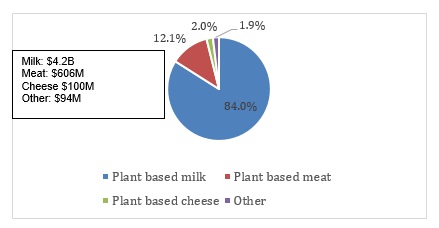GROCERY WARS – “THE EMERGENCE OF THE PLANT BASED FOOD SECTOR”!
Plants have been a staple household item for many years. Yet a different plant sector is emerging with consumers – Plant Based Foods, a sector that for the past two (2) years has been identified as a food trend to watch for. So, what is plant based food, what are category sales, what are the four (4) consumer trends driving the rapid rise of this sector and what are some associated health benefits to the consumer?
Plant Based Foods
Plant based foods are foods that are derived from plants including vegetables, whole grains, legumes and fruits. A plant based food diet consists of these items in addition to excluding or minimizing meat (including chicken and fish), dairy products, and eggs, as well as highly refined foods like bleached flour, refined sugar, and oil.
Plant Based Food Category Sales
The plant based food category in the US exceeds $5B in sales annually. The Canadian category is estimated at between $450 – $600 million dollars. The US market grew 3.5% in 2016 and outpaced the total food and beverage industry by close to a 2:1 margin. Economic activity in the plant-based foods industry leads to sales of $13.7 billion a year throughout the U.S. economy.
The plant based market is driven by refrigerated and frozen non-dairy beverages, meat alternatives and tofu and cheese alternates, that collectively account for more than 90% of sales.
Chart 1 outlines plant based food sales.Cheese alternatives are the fastest growing sector in the category with 31.4% growth.
Chart 1
Plant Based Category Sales – US, 2016

Smaller categories contributing to growth include: meat alternative dishes, yogurts, meatless jerky and snacks, other dairy alternatives and vegan mayonnaise and similar products. In the US, introductions of new products with plant based proteins grew 14.7% in 2014.
Though traditional retailers account for the bulk of the sales volume, specialty and natural channels in the US are posting the fastest growth for plant based foods, up 6.8% and 11.6% respectively over the last year.
According to Mintel, 36% of consumers in the US buy plant-based meats. In Canada, a 2015 survey conducted by the Vancouver Humane Society and administered by polling company Environics “revealed that 33 percent of Canadians are either already vegetarian or are eating less meat. Seeking to capitalize on this new sector, Maple Leaf Foods recently signed a definitive agreement to acquire plant-based protein brand Lightlife Foods, Inc
Four Consumer Trends Driving Growth of Plant Based Foods
The steady growth of the plant based food sector is a reflection of more consumers shifting away from animal products towards plant based options. Consumers have become wary of red meat varieties because of environmental or animal rights concerns and view plant based alternatives as cleaner, more nutritious than red meat and dairy products.
Here are the four (4) consumer trends that are fueling plant based sales:
- Drop in Meat Consumption: Concerns about animal cruelty and the use of hormones and antibiotics has resulted in a decline in meat consumption. Since 1999 and ending September of 2015, Canadians consumption per person of pork and beef has declined 31% and 19% respectively.
- Drop in Dairy Consumption: Fueled by evidence of animal cruelty, Canada’s changing demographic profile and consumers’ perception of dairy’s nutritional value, per-capita consumption of milk in Canada has declined 18% to 74 litres a year between 1995 and 2014.
- Values Based Shopping: Consumers seek to purchase brands that have an authentic mission and a positive social and environmental impact. According to Nielsen for the 12-month period ending September 2015, sales of consumer goods from brands with a demonstrated commitment to sustainability grew more than 4% globally, while those without grew less than 1%.
- Power of Millennials: Millennials are one of the most powerful consumer groups in Canada. In 2014, they accounted for 37% of the work force. As a group, they recognize their food choices have a real impact on society and the environment. One in 10 is a vegetarian or vegan and they are at the forefront for the increased demand in plant based food options.
Perceived Health Benefits Associated with Plant Based Foods
The thought of life without steak or barbecued chicken may not sound appealing. Fortunately, consumers don’t have to make an either / or choice, A strong body of research suggests just making a shift to more plant based foods can offer significant health benefits. Some of the perceived benefits includes:
- Reduced blood pressure.
- Reduce the risk of heart disease and Type 2 diabetes.
- Help maintain a healthier weight.
- May lengthen lifespan.
It is never too early or late to embrace a healthier lifestyle. The benefits come quickly and continue to accrue with age.
The Impact for Small Business
Plant based category sales are outpacing the total food and beverage industry. This sales data provides evidence that plant based proteins may be here to stay. In today’s market innovation is critical and a key aspect as to why sales for smaller brands in the US are outpacing the growth of larger brands. Given most larger brands do not offer plant based food as part of their portfolio, business seeking to get into the food sector may wish to embark on a journey into this category. In fact, in the US the Plant Based Foods Association (www.plantbasedfoods.org) was established last year to advocate for better policies to meet the growing consumer demand for plant based foods.
For assistance in Getting and Staying Listed in Canada’s Grocery Sector, connect with us through our website: www.fooddistributionguy.com, or give us a call toll free: 1-844-206-FOOD (3662).





